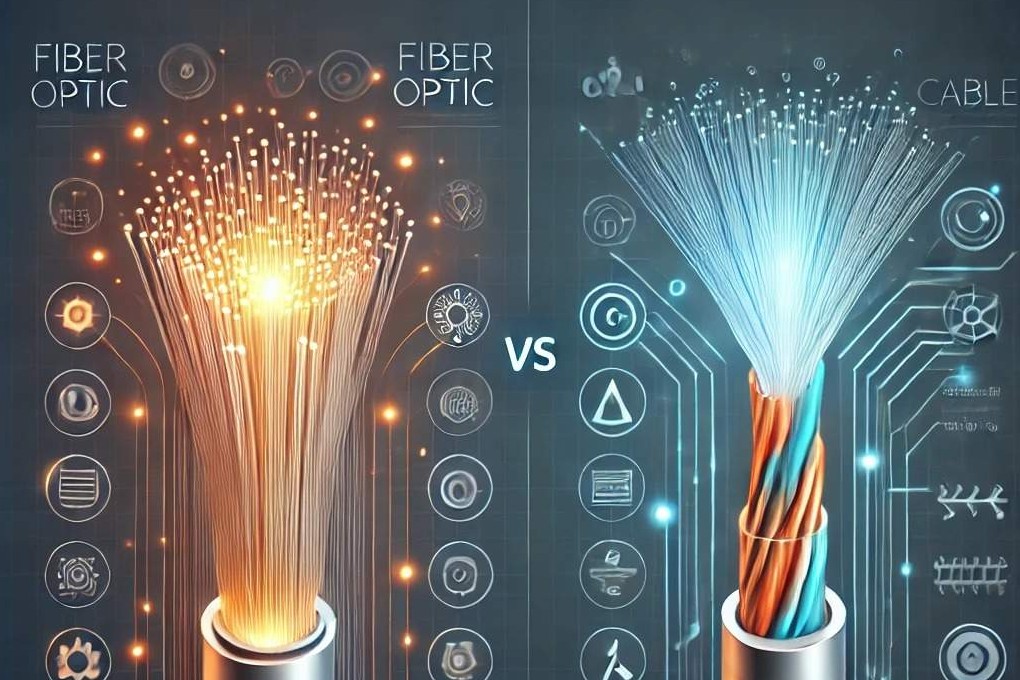12 November 2024
Difference between Fiber Optic and Copper Cable
In today's digital world, choosing the right cable for your internet connection is critical for speed, stability, and security. Fiber optic cable and copper cable are the most commonly used cable types.
What is Fiber Optic and Copper Cable?
- Fiber Optic: Fiber optic is a type of cable made of very thin glass or plastic fibers, which is used to transmit data through light waves. Compared to conventional cable technology, fiber optic offers very high transmission speed and capacity. These cables are ideal for long distances as light travels fast and does not degrade in quality even over long distances.
- Copper Cable: Copper wires are wires that have long been used for the transmission of electrical signals. Since it uses electricity as a medium for data transmission, copper cables are still popular for local networking (LAN) and basic applications. Although it has lower speeds than fiber optic, copper cable is more economical and reliable for short-distance connections.
Fiber Optic Advantages
1. High Speed
Fiber optic is capable of transmitting data at much higher speeds than copper cables. This is due to the use of light as the transmission medium, which allows data transmission in gigabits per second.
2. Large Bandwidth Capacity
Fiber optic cables can support very large bandwidths, making them suitable for applications that require high data capacity, such as video streaming, cloud computing, and video conferencing.
3. Stability over Long Distances
Unlike copper cables, fiber optic cables are capable of transmitting data over very long distances without experiencing signal quality degradation. This makes it ideal for connections between cities or countries.
4. Resistant to Electromagnetic Interference
Because it uses light, fiber optic is not affected by electromagnetic interference from other devices, weather, or the surrounding environment, making the connection more stable and reliable.
5. High Data Security
Fiber optics are difficult to tap into without disrupting the signal, providing a higher level of security for sensitive data.
Copper Cable Advantages
1. More Economical Cost
Copper cable installation is generally cheaper than fiber optic, making it an economical choice for basic needs or local networks that do not require high speeds.
2. Availability and Flexibility
Because it has been used for decades, copper cable is still widely available and easy to integrate with existing devices and infrastructure.
3. Suitable for Short Distances
Despite their lower speeds, copper cables are reliable enough for short-distance connections such as in offices or buildings, where stability and interference are not major concerns.
4. Easy Installation
Copper cables are easier to install on existing infrastructure, especially for networks that already have a copper cable system in place.
Fiber Optic vs Copper Cable: Which One to Choose?
Each type of cable has advantages and disadvantages that need to be considered according to your needs and budget.
Use Fiber Optic if You Need It:
Very high-speed internet connection
Long distance data transmission without quality loss
Higher data security
Compared to other devices, this cable has a connection that resists electromagnetic interference
Use Copper Cable if You Need:
An economical solution for short-distance connections
Basic connection such as a local network (LAN) for offices or small buildings
Flexibility to connect with older devices or infrastructure that already uses copper cables
Both fiber optic and copper cables have their own advantages that can be adjusted according to user needs. If you need a high-speed, stable, secure, and long-distance connection, fiber optic is the best choice. However, if you need a solution that is more economical and reliable enough for short distances, copper cable can be the right choice.
Is this information helpful?
